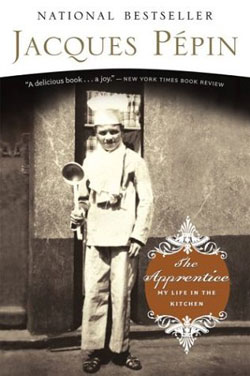 Suzanne Goin, the uber-talented celebrity chef of Lucques and A.O.C.
Wine Bar fame, was rumored to be the front runner for the
2005 James Beard Chef-of-the-Year award, and as far as I was concerned,
she could just skip the swim suit competition and pick up her gold
toque and tongs. Because praise the lord and pass the friggin’ salt
cod, if food could cure cancer, it would be this food. May The God of
Good Eatin’ please keep Suzanne Goin’s hands hale, hearty, and forever
heating up the small plates.
Suzanne Goin, the uber-talented celebrity chef of Lucques and A.O.C.
Wine Bar fame, was rumored to be the front runner for the
2005 James Beard Chef-of-the-Year award, and as far as I was concerned,
she could just skip the swim suit competition and pick up her gold
toque and tongs. Because praise the lord and pass the friggin’ salt
cod, if food could cure cancer, it would be this food. May The God of
Good Eatin’ please keep Suzanne Goin’s hands hale, hearty, and forever
heating up the small plates.
 Having earlier experienced both the exquisite pleasure and excruciating
pain that comes from washing down four or five pounds of Chicken Liver
pate with fifteen dollar glasses of 2001 Chateauneuf du Pape, I was
careful to prepare my sensitive digestive tract by fasting for
practically an entire half-day on Fiji Natural Artisan water, plus a
supplemental half-inch rind of smoked salami that I discovered under a
plastic tankard of Barefoot Contessa Moussaka that I accidentally made
five weeks ago in a bizarre attack of culinary industry. As a note, I
have a firm policy of never throwing away any left-over that originally
took more than sixty minutes to prepare, unless it starts to stink
worse than my daughter’s feet did after two weeks at Catalina Camp,
where filth is a fashion statement.
Having earlier experienced both the exquisite pleasure and excruciating
pain that comes from washing down four or five pounds of Chicken Liver
pate with fifteen dollar glasses of 2001 Chateauneuf du Pape, I was
careful to prepare my sensitive digestive tract by fasting for
practically an entire half-day on Fiji Natural Artisan water, plus a
supplemental half-inch rind of smoked salami that I discovered under a
plastic tankard of Barefoot Contessa Moussaka that I accidentally made
five weeks ago in a bizarre attack of culinary industry. As a note, I
have a firm policy of never throwing away any left-over that originally
took more than sixty minutes to prepare, unless it starts to stink
worse than my daughter’s feet did after two weeks at Catalina Camp,
where filth is a fashion statement.
A Celebration of Chefs and Others
A Celebration of Chefs
In Traffic with Jacques Pepin
 Although my commute is a short one, traffic puts me in a bad mood. I’m impatient and irritated, not qualities that make for a tranquil drive. My commuter’s grumpiness was recently soothed by none other than Jacques Pepin himself, master chef, teacher, and internet star along with the beloved Julia Child and others. He didn’t actually sit next to me flipping crepes in the passenger seat, but he did write the wonderful book The Apprentice: My Life in the Kitchen
Although my commute is a short one, traffic puts me in a bad mood. I’m impatient and irritated, not qualities that make for a tranquil drive. My commuter’s grumpiness was recently soothed by none other than Jacques Pepin himself, master chef, teacher, and internet star along with the beloved Julia Child and others. He didn’t actually sit next to me flipping crepes in the passenger seat, but he did write the wonderful book The Apprentice: My Life in the Kitchen (Houghton Mifflin, 2003), and I borrowed the audio book from the equally wonderful public library.
Pepin does not do the narrating on the audio book himself, and I suspect his accent may have been one of the reasons. The lack of his own voice is perhaps the only issue I have with the audiobook. The narrator speaks with just a smidge of a French accent, so he is easy to understand, but he is not a skilled reader and sometimes lets the natural drama in some of Jacques’s stories fall flat. If you’ve ever seen Jacques Pepin on one of his television cooking shows, you know he has personality, and his energy and humor would have made the audio version of a wonderful read soar. Stories of childhood summers spent on farms during World War II and then years in his mother’s restaurant followed by grueling apprenticeships in classical French restaurants often made me wish my drive home was longer.
Discovering Mexican Flavors
 Who knew from Mexico whilst being brought up in the Monopoly board
burbs of Southern New England in the fifties? It seemed a very distant
land – exotic, fantastic – as foreign and far away as California. The
word Mexico called to mind jumping beans, dancing with sombreros,
"Z's" slashed midair, Cisco and his humble sidekick Pancho galloping
away, Pancho Gonzales slamming a tennis serve, Speedy Gonzalez slamming
a cat — a lot of really speedy stuff. It's no wonder I thought the
Mexican peoples only ate fast food.
Who knew from Mexico whilst being brought up in the Monopoly board
burbs of Southern New England in the fifties? It seemed a very distant
land – exotic, fantastic – as foreign and far away as California. The
word Mexico called to mind jumping beans, dancing with sombreros,
"Z's" slashed midair, Cisco and his humble sidekick Pancho galloping
away, Pancho Gonzales slamming a tennis serve, Speedy Gonzalez slamming
a cat — a lot of really speedy stuff. It's no wonder I thought the
Mexican peoples only ate fast food.
I was growing up in the miraculous new age of instant gratification
grub. Chinese food, pizza, take out burgers, and foods hunted and
gathered from pouches and frozen boxes were America's new staples. New
sorts of consumables were purchased by my parents weekly. I recall my
first corn products off a cob – daffy yellow corn chips crunched hand
over fist in front of the television console, lumped into a large
category called "snacks." Anything one ate away from the dinner table
and consumed mindlessly, endlessly, with no silverware, that soiled
your fingers and "ruined your appetite" was a "snack." So when I
visited California in seventy-two and experienced Mexican food at a
party for the first time, corn chips dipped in a tasty chartreuse
paste, it continued to seem "snack," and not to be taken seriously.
Man vs. Food: Watch It!
 Once Anthony Bourdain left The Food Network in a trail of acrimonious dust, he started a second television career on The Travel Channel. The show (”No Reservations”) was better (because, among other things, they allowed Anthony to be his acerbic, outrageous self) but he was gone from my life because the Travel Channel was not available from our cable company. We ordered episodes from Netflix, took them out of the library, and once, in a media coup that rivalled the day when my brother and I tuned in what we believed to be “porn”on the TV in the living room by fiddling rabbit ears and vertical hold, we found one episode of “No Reservations” on “On Demand,” and watched it with the fervor and intensity appropriate for a bootleg copy of Tommy and Pamela.
Once Anthony Bourdain left The Food Network in a trail of acrimonious dust, he started a second television career on The Travel Channel. The show (”No Reservations”) was better (because, among other things, they allowed Anthony to be his acerbic, outrageous self) but he was gone from my life because the Travel Channel was not available from our cable company. We ordered episodes from Netflix, took them out of the library, and once, in a media coup that rivalled the day when my brother and I tuned in what we believed to be “porn”on the TV in the living room by fiddling rabbit ears and vertical hold, we found one episode of “No Reservations” on “On Demand,” and watched it with the fervor and intensity appropriate for a bootleg copy of Tommy and Pamela.
Then, one day, the Travel Channel appeared as I was flipping up towards the Premiums, bearing the portentous channel assignment “123.” (It’s portentous because I can remember it). We fell, that evening, under the spell of a young man named Adam Richman, and a show called “Man v. Food.” We fell hard. It is fabulous beyond all reckoning that we can now see “No Reservations” before the episodes are two years old, and there are a couple of other shows on the channel that we’ve enjoyed, but Richman is a revelation of how a network can combine really smart and really commercially appealing and create something that appeals to a large and diverse audience.
Cooking Through Time
 Sometimes we stumble upon books or products we just have to share. The Military Wives' Cookbook
Sometimes we stumble upon books or products we just have to share. The Military Wives' Cookbook is a fascinating read on so many levels and the meals created are both delicious and timeless.
It is a collection of recipes, anecdotal stories, soldiers' letters home and vintage photographs tracing the history and unique contributions of American military wives. It recreates the scenes and foods that showcase the commitments and sacrifice that military wives have given the nation for more than two hundred years, beginning with the American Revolution.
The recipes are broken down into special events and daily menus, such as The Country Brunch. The entry for Strawberry Butter Spread begins with the following letter:
"An officer made me a miniature churn with a bottle and a little wooden dasher put through a cork. We were at the time marching each day farther and farther into the wilderness, but occasionally came to a ranch where there was a little cream...and as I sat under the tent-fly after we made camp, it was soon transformed into butter in the toy churn." -- Libby Custer
More Articles ...
Welcome to the new One for the Table ...
Our Home Page will be different each time you arrive.
We're sure you'll find something to pique your interest...

